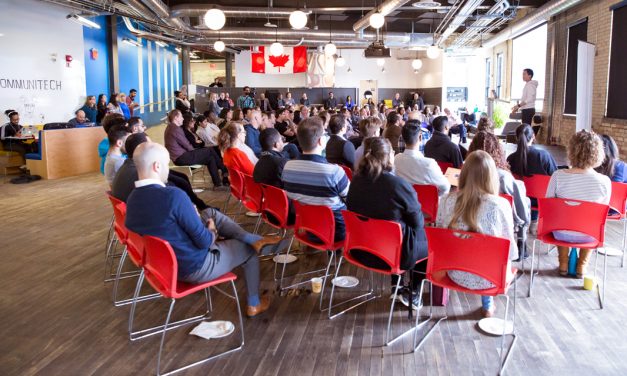Mappedin’s next big thing?
Firefighters. First responders. Public safety.
“It turns out firefighters care more about indoor maps than everybody else combined,” says Hongwei Liu, speaking Tuesday at the Tannery.
Firefighters. Of course.
As Liu explained to his lunchtime audience at a session of Pizza with the Prez, one in a series of lunchtime chats with tech leaders hosted by Communitech, firefighters show up at a burning building bearing a paper map of its interior that might be 30 years or more old, one that doesn’t account for all the possible interior changes that have taken place in the interim.
“They look at that [map] for 30 seconds and then go inside and hopefully find what they were looking for and don’t run into things they weren’t expecting.
“It’s absolute madness.”
Addressing the madness is Mappedin’s reason for being.
Mappedin is a Waterloo company started by Liu and two co-founders (who have since moved on), in 2011. It exists to make maps digital, rather than paper. It corrals all the various dated, incorrect paper versions of an interior map that might exist and makes them … behave.
“Our core focus is to build the digital model of the indoors,” says Liu.
Mappedin’s public safety push coincides with the smart cities digital dialogue that is now under way worldwide. The timing, as he says, “is good.

The scene Tuesday at the Tannery. (Communitech photo: Sara Jalali)
“I’m a little biased, but digitizing cities and saving lives seems like the most concrete, obvious, easy-to-support mandate in the smart-cities ecosystem.”
In the past two years Mappedin has doubled its complement of employees to 65 and increased its yearly recurring revenue from $1 million to $3 million; it does another $1.5 million per year in professional services. Liu is aiming to reach $10 million in revenue this year, “but we’ll likely get to eight or nine.”
The company now has 30 customers in 17 countries.
Moving the needle on sales, Liu says, is something every CEO needs to address, and should do by leading from the front, by doing the very job they would ask of a salesperson.
“The founder has superpowers. You’re the most credible, the most authentic. The customer wants to deal with you. The founder can do things that any salesperson cannot.
“In reality [sales is] a firm handshake and a lot of running around. That’s all it is.”
Liu is a former University of Waterloo student. His decision to keep his company in Waterloo Region is deliberate. Why?
Because “it’s one of the best places to build a business.”
He says he gets a merger or acquisition offer “every six months.” Yet he stays put and keeps building.
“The way I see it is, my education is taxpayer funded,” he says. “I grew up in Canada. My company is taxpayer-funded to some degree.
“It seems like it would be hard to call it a win if I sold out to a U.S. company, extracted my rent as a middle man of the transfer of that value.
“We invented the Avro Arrow. We discovered insulin. Yet [the U.S., not Canada] has the biggest pharma and military industrial complex on earth.
“I don’t know how that happened, but I’d like to at least say I try to do my part.”

